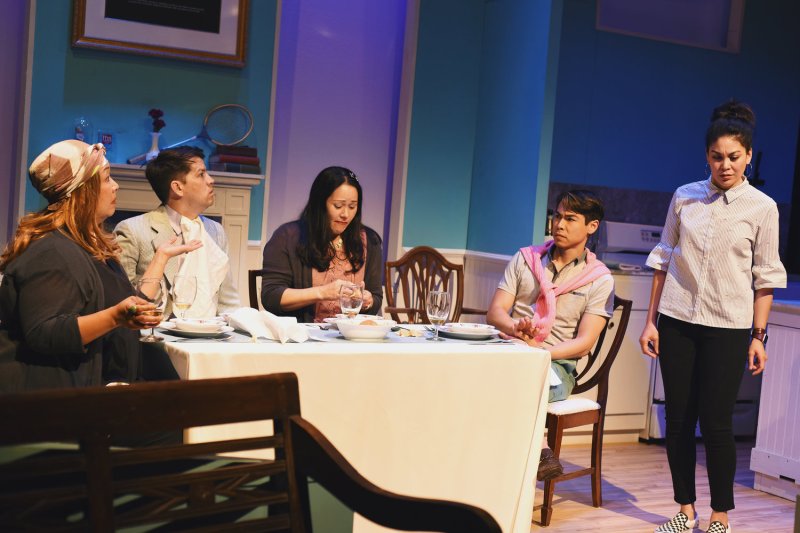A summer home in the Hamptons owned by a stern but grieving matriarch; an affluent film star father, now deceased, whose legacy echoes throughout the halls; a reunion between step-siblings filled with mounting tensions as the family’s skeletons are pulled from the closet, one by one:
It all sounds so… WASP-ish.
This is the premise behind Leah Nanako Winkler’s “Two Mile Hollow,” a world premiere produced by Ferocious Lotus Theatre Company and directed by Lily Tung Crystal. Under Crystal’s deft vision, this rollicking farce tells the story of the Donnellys, a dysfunctional Caucasian family who convenes at their soon-to-be-sold chateau, located in the eponymous Two Mile Hollow. If the plot bears any similarity to something out of a Tennessee Williams or Eugene O’Neill play, the resemblance is intentional: “Two Mile Hollow” is Winkler’s response to the genre of theater she calls “White People by the Water.” Throughout the play, the cast — all actors of color, playing white characters — engage in a hilarious and scathing parody of the classic American theatrical canon.
Randy Wong-Westbrooke’s scenic design fills the cozy Potrero Stage. A badminton racket cocked jauntily on the mantle; a granite countertop kitchen, complete with matching kitchen island; an ostentatious portrait of the family’s late patriarch, framing the scene with its omnipresence: Wong-Westbrook’s eye for detail grants the theater the stately ambience of a Long Island manse, but its austerity also serves the twofold purpose of providing a stark contrast to the absurdity of caricatures being portrayed.
The show’s ensemble shines brightest as they play off each other. Michelle Talgarow plays Blythe, the family’s widowed mother with a hair-trigger temper as delightful as it is shrewish, who spends much of the play chastising her stay-at-home daughter Mary (a sentimental Karen Offereins). Greg Ayers acts as Blythe’s stepson Joshua, a self-proclaimed manic depressive whose neuroses drive him to quarrel with his Hollywood hotshot brother Christopher, brought to life with insouciant charisma by Sean Fenton (‘02 — a Stanford alum!). These actors portray the relentless ego of the Donnelly family in a soap operatic style, monologizing over each other with expert comic timing.
The cast is rounded out by the presence of Christopher’s personal assistant and gofer, Charlotte (Rinabeth Apostol) — the only character who is textually stated to be not white. Charlotte exists in a liminal space, simultaneously a member of the play’s ensemble and an outsider to the family. Like the rest of the Donnellys, she breaks the fourth wall and delivers parodic exposition, but her race, class and starving artist lifestyle alienate her from the rest of the family. She is an audience surrogate, an underdog swimming amidst upper-crust sharks whose quippy nature confronts the Donnellys and the audience alike. Apostol juggles the nuanced contradictions of this character with disarming poise.
Though playwright Winkler’s grasp of genre is impeccable, the text deliberately pulls us out of the farce at times through the inclusion of odd interludes and dialogue choices: an unexpected Broadway-esque love duet, a feminist interpretive dance number and sly digs about interracial dating apps and Black Twitter. These moments may seem jarring or even obtrusive, but they serve a higher narrative function: they highlight the way that our cultural understanding of the theater is rooted in historical conventions and archetypes that are overwhelmingly white, male and upper class.
As such, we expect a family to quarrel with itself over dinner, because we have been conditioned to expect a family onstage to quarrel with itself over dinner. We expect a monologue chock full of nature metaphors, because our mental image of the theater includes this. We expect a thunderstorm at a dramatically appropriate moment, because of course that’s what is going to happen. Winkler understands these touchstones of the theatrical genre — but just as Charlotte’s presence in the Donnelly home intrudes upon the white bastion of upper-crust security, Winkler’s textual deviations seek to break the formal structure of the play. If any of the show’s contemporary allusions feel stilted or out-of-place, it is only to remind the audience that the characters they see onstage are not a relic of the past, nor a wholly fictitious caricature: these people are real, the beliefs that they hold are present and they still exist today.
“Two Mile Hollow” may be poking fun at stereotypes, but it brings a much-needed perspective to long-standing debates about yellowface, representation and cultural authenticity. Winkler’s response to this discourse — deliberate, unabashed whiteface — is a refreshingly scathing satire on white upper-class perspectives that reverses traditional norms.
“Two Mile Hollow” runs at the Potrero Stage in San Francisco through July 15. Tickets run $15-40 and can be purchased online at ferociouslotus.org.
Note: A previous version of this article incorrectly stated the scenic designer as Randy Wong-Westbrook. The correct spelling is Randy Wong-Westbrooke.
Contact Caro Asercion at casercio ‘at’ stanford.edu.
